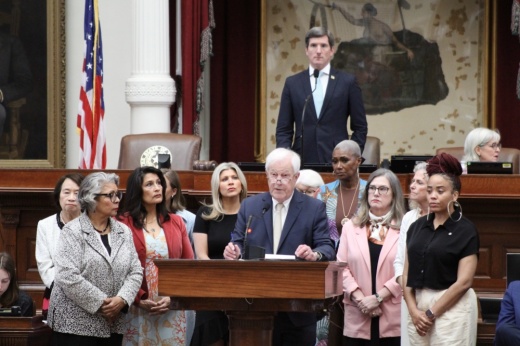Deemed the “Life of the Mother Act,” Senate Bill 31 would standardize the definition of a medical emergency in state statute. Doctors would not need to wait until a risk to their pregnant patient’s life is “imminent” or until the patient is physically impaired, according to the bill.
The big picture
Rep. Charlie Geren, a Fort Worth Republican who sponsored the bill in the House, said lawmakers intended to give doctors “clear, consistent, fair and understandable” guidelines to protect women’s lives and health without allowing elective abortions.
Geren was flanked by female lawmakers from both political parties as he explained the bill on the House floor May 21.
“Simply, we do not want women to die from medical emergencies during their pregnancy,” Geren said. “We don't want women's lives to be destroyed because their bodies have been seriously impaired by medical emergencies during their pregnancies. ... We know women have left Texas for life-saving care.”
SB 31 initially passed the House with a 129-6 vote May 21. Six House Republicans voted against the bill, and 10 marked themselves “present, not voting.”
The proposal by Sen. Bryan Hughes, R-Mineola, passed the Texas Senate unanimously in April. House lawmakers must take one more procedural vote on SB 31 before sending it to Gov. Greg Abbott, who has not publicly stated if he supports the bill.
“We are in no way promoting abortion—what we are trying to do is save the life or the major bodily functions [of women],” Geren said. “I get a little emotional about this, but I've got friends who watched their wives nearly bleed out and become septic. That's the driver in this.”

Texas banned nearly all abortions in August 2022, with limited exceptions to save a pregnant patient’s life or prevent “substantial impairment of a major bodily function.” The law does not include exceptions for rape or incest.
Physicians who violate Texas’ abortion law face strict criminal penalties, including life in prison, at least $100,000 in fines and the revocation of their medical license. During meetings of the Texas Medical Board in 2024, doctors said “confusion” about the law had delayed potentially life-saving care.
“[Physicians] know what conditions can cause a risk to a woman's life,” Dr. Ingrid Skop, a San Antonio OB-GYN, said in March 2024. “But we need to be reassured that we can intervene at the time the diagnosis is made; we do not need to be waiting until a woman is dying.”
Skop works for the Charlotte Lozier Institute, an anti-abortion research organization.
The medical board adopted a rule outlining medical exceptions to the abortion law on June 21. Board president Dr. Sherif Zaafran previously said the board has the ability to “enforce the law as it’s written,” noting that the law can only be altered “through the legislative process.”
Twenty women sued the state in 2023, saying they were denied abortions despite experiencing severe pregnancy complications. The Texas Supreme Court unanimously upheld the abortion law about a year later, according to previous Community Impact reporting.
Zooming in
On the House floor May 21, Geren said lawmakers worked closely with doctors, hospitals and “people on both sides of the abortion issue” to fine-tune SB 31.
“These groups don't always see eye to eye,” Geren said. “In this case, they worked together to ensure pregnant women with pregnancy complications get appropriate and timely care.”
Rep. Tom Oliverson, R-Cypress, who is an anesthesiologist, said he had heard “heartbreaking” stories of pregnancy complications that could kill both the mother and her fetus.
“I can't tell you how many times I've had [that] conversation with my colleagues, and I get really sick & tired of having to respond by saying, 'I don't know,’” Oliverson said.
“That’s what we’re trying to fix,” Geren said.

“Will more or less babies be murdered by abortion?” Rep. Briscoe Cain, R-Deer Park, asked Geren.
“This will not provide an excuse for abortion,” Geren said, noting that “probably more babies will die in an effort to save women.”
After several lawmakers raised questions about the potential effects of the bill, Rep. Mitch Little, R-Lewisville, said there was “tension” between “a very laudable goal and an important thing to do, protecting women who are pregnant, and... a concern among our conservatives in the room that this bill will be used as a pretext for elective abortion.”
Geren said that if physicians tried to circumvent state law, they could still be charged with medical malpractice or face 99 years in prison. He added that women who seek or get an abortion would not be prosecuted.
SB 31 would also require physicians and lawyers to take continuing education courses breaking down the specifics of Texas’ abortion laws and the medical exceptions.
Rep. Shelby Slawson, R-Stephenville, said lawmakers intended to “protect innocent life [and] also protect mothers” with the 2021 legislation that banned nearly all abortions in Texas. She said SB 31 would help achieve that goal.
One more thing
House lawmakers also initially approved SB 33, which would prohibit cities and other government entities from spending public funds on out-of-state abortion travel and related services, on May 21.
“Tax dollars should not facilitate travel to another state for an act that is not allowed here,” bill sponsor Rep. Candy Noble, R-Lucas, said, noting that at least one Texas city found a “loophole” in current law and allocated funds to nonprofit organizations “to pay for Texas women to travel out of state for the purpose of an abortion.”
In a May 21 social media post, Austin city council member Vanessa Fuentes said SB 33 would preempt $400,000 in reproductive health funding included in the city’s fiscal year 2024-25 budget.
“SB 33 doesn’t protect anyone, it only serves to punish cities that dare to stand up for their people,” Fuentes said on social media. “By targeting Austin’s Reproductive Logistical Fund, this law sends a clear message that Austinites don’t deserve the freedom to make personal medical decisions or the right to policies shaped by our values.”





